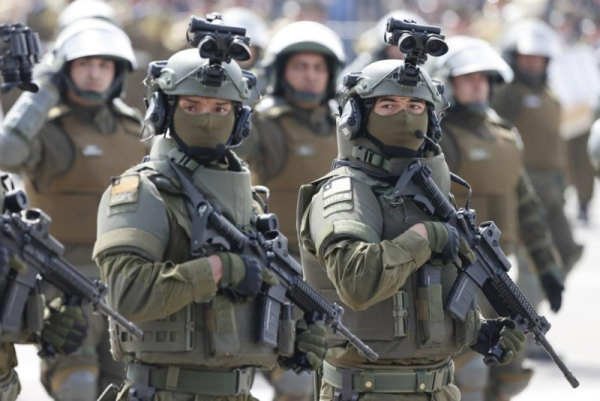

Proposed reform, introduced earlier this month in the Chilean Senate for debate, would grant the armed forces power to conduct identity checks and searches. File Photo by Elvis Gonzalez/EPA
President Gabriel Boric has submitted a constitutional reform proposal to the Chilean Congress that would make the armed forces permanently responsible for security in border areas, aiming to curb organized crime and irregular migration.
Border control is handled by Carabineros de Chile, the national police, and when the armed forces are needed for specific security operations, the government must request congressional authorization every 90 days.
The proposed reform, introduced earlier this month in the Senate for debate, would grant the armed forces power to conduct identity checks and searches. It would also allow soldiers to detain individuals caught committing crimes and hand them over to the Carabineros de Chile, or the Investigative Police.
According to the reform bill, the current situation is described as troubling.
“Along with the impact of irregular migration on the country, social cohesion and public policies, this phenomenon has been exploited by transnational criminal organizations to expand illicit markets such as smuggling, human trafficking and drug trafficking, among others, as well as to facilitate the illegal entry or exit of gang members through unauthorized crossings,” the document states.
Days before the bill’s introduction, Boric said he was confident Congress would move quickly to approve the reform “because that is what Chileans expect.”
The National Prosecutor’s Office, the agency that investigates crimes in Chile, on Monday released its 2025 Organized Crime Report, revealing that at least 16 transnational criminal organizations are operating in the country, including Venezuela’s Tren de Aragua, Colombia’s Los Shottas and the Trinitarios, active in the Dominican Republic and the United States.
Although drug trafficking remains the dominant criminal activity — accounting for nearly half of all income linked to organized crime in 2023 and 2024 — the report noted that crimes such as kidnapping and extortion showed the sharpest increases, while homicides dropped significantly.
The surge in irregular migration and organized crime has dominated Chile’s public and political agenda ahead of the elections. Presidential and congressional elections are set for Nov. 16, and the government is signaling its priorities through measures such as this proposed constitutional reform.
“One of the most prominent issues on the national agenda concerns crime and irregular migration, which people tend to see as connected,” political scientist Claudio Fuentes, director of the Institute for Social Science Research at Diego Portales University, told UPI.
He added that the reform proposal aims to show the government’s concern, “particularly that of the Chilean left, about border security, given the prominence the issue has gained and in the context of the presidential elections.”
Fuentes said the problem is that the government does not control either chamber of Congress, so the initiative will depend on opposition parties.
“It’s unlikely to be approved before the end of the administration [in March] because lawmakers are debating the 2026 budget in the middle of the parliamentary campaign. So this bill is more of a political gesture than a legislative measure likely to be discussed,” he said.
From Fuentes’ perspective, certain aspects must be addressed first.
Another bill pending in Congress would regulate the armed forces’ use of force in situations such as border control. Fuentes warned a risk exists that the military could operate under rules that might expose its members to legal consequences if they are accused of using excessive force in certain circumstances.